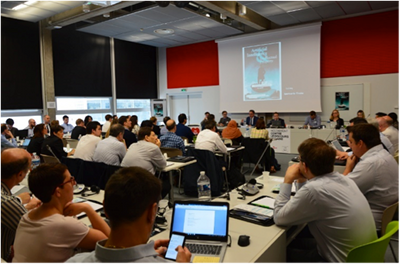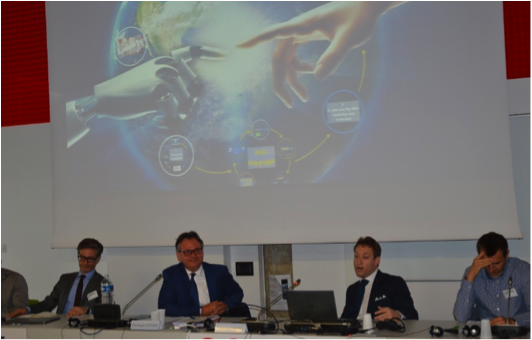CEIPI Education Program in IP Strategies for AI Technologies
Artificial intelligence is making its way from universities and laboratories of computer science departments into companies, business models, and the everyday lives of consumers. The market for AI-based technologies is set to grow from US$ 8 bn in 2016 to an estimated US$ 47 bn in 2020. As recently as in 2017, AI technologies saw a 300% increase in investment activities. There are a number of regulatory and strategic implications associated with AI-based technologies, which were discussed during a dedicated CEIPI seminar in Strasbourg from May 24-26. The seminar was about the theoretical, historical, and market environments giving rise to the regulation of artificial intelligence (AI), machine learning (ML), and robots. Special emphasis was placed on machine-generated or computational creativity during the seminar. The disruptive effects of AI on traditional business models will require a rethink of the intellectual property (IP) framework and strategies. Against this backdrop, this seminar presented legal tools available to protect AI, including trade secrets, copyright, and patent protection. Another point on the agenda was an introduction to the efforts made in the normative landscapes of multiple jurisdictions, which could potentially be the start of a ground-breaking revolution. The seminar also touched on how alternative approaches to computational creativity regulation will have far-reaching commercial implications, shifting incentives for developing AI.
There was a dedicated module on novel issues emerging in connection with AI and data management. The processing of data and big data is indeed a fundamental part of machine learning. Data ownership might emerge as critical issue to be carefully considered when dealing with AI and ML systems.  Developing AI and ML systems generally involves training these systems using large datasets, so they can continuously improve their decision-making abilities. But who owns the IP in the datasets used to train the system? Although data might be freely available online, it cannot be used for all purposes. Therefore, genuine issues of liability for the use of proprietary data in ML processes might arise. On the other hand, data protection regulation will play an important role in the evolution of AI and ML systems. Another key focus of the seminar was therefore on relevant legislation and case law, with particular emphasis on the interpretation of the provisions of the upcoming EU General Data Protection Regulation on profiling and automated decision-making.
Developing AI and ML systems generally involves training these systems using large datasets, so they can continuously improve their decision-making abilities. But who owns the IP in the datasets used to train the system? Although data might be freely available online, it cannot be used for all purposes. Therefore, genuine issues of liability for the use of proprietary data in ML processes might arise. On the other hand, data protection regulation will play an important role in the evolution of AI and ML systems. Another key focus of the seminar was therefore on relevant legislation and case law, with particular emphasis on the interpretation of the provisions of the upcoming EU General Data Protection Regulation on profiling and automated decision-making.
 Finally, the patent strategy module, held by Jean-Marc Deltorn, patent examiner at the European Patent Office, EPO, looked at the vast array of issues related to patenting AI and ML (machine learning) systems. In this context, international legislation, case law, and the practices of patent offices were discussed during this module, with special emphasis on EU-US comparative analysis. A fundamental challenge for protecting AI technologies is to develop claims with a patentable subject matter. Another important issue this module looked at was how to identify the inventive step in developing AI-related patents. Furthermore, satisfying disclosure requirements can be challenging when seeking patent protection for AI-based inventions. What should be disclosed in AI inventions to meet the requirements? Again, how should an AI-based invention claim be drafted? How does the doctrine of equivalents apply to AI inventions? Do different standards apply to rule-based systems and neural networks? These were some of the highly relevant questions for IP strategy makers that were discussed during the seminar.
Finally, the patent strategy module, held by Jean-Marc Deltorn, patent examiner at the European Patent Office, EPO, looked at the vast array of issues related to patenting AI and ML (machine learning) systems. In this context, international legislation, case law, and the practices of patent offices were discussed during this module, with special emphasis on EU-US comparative analysis. A fundamental challenge for protecting AI technologies is to develop claims with a patentable subject matter. Another important issue this module looked at was how to identify the inventive step in developing AI-related patents. Furthermore, satisfying disclosure requirements can be challenging when seeking patent protection for AI-based inventions. What should be disclosed in AI inventions to meet the requirements? Again, how should an AI-based invention claim be drafted? How does the doctrine of equivalents apply to AI inventions? Do different standards apply to rule-based systems and neural networks? These were some of the highly relevant questions for IP strategy makers that were discussed during the seminar.
Download the full program [here].



